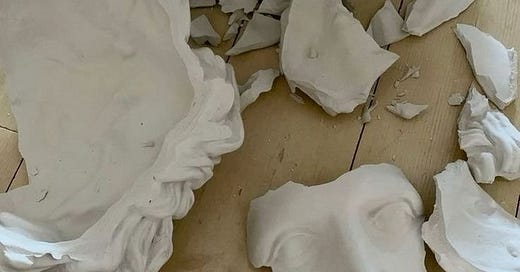Society doesn’t like the ugliness of emotion. Those suffering are often treated like killjoys, even if they aren’t explicitly labeled as such. Since we humans don’t just communicate verbally—we know when society doesn’t approve of any of our behaviors. You get the look when you laugh or smile too much and get called immature; you witness the bystander effect when you need help that isn’t superficial for once and get called draining (people start protecting their energy, lol); you get crucified when your perspective is too complex for society’s need for comfort through simplicity and convenience, and get called weird.
Unfortunately, many people succumb to the demands of society and water themselves down, and that included me at some point in my life. I once diluted my personality, feelings, interests, experiences, etc., to keep them in line with the status quo—and ended up expressing not myself, but what society wanted from me. This mask we build not when we are genuinely happy and content with life, but when the house is tumbling down in a passing storm and we need an illusion to hold onto. The illusion of being loved and accepted by others—because our ancestors survived tough times through their social strategies and passed on their people-pleasing genes to us. In a desperate attempt at survival, we put an artificial smile on our faces that looks real enough to fool society into recognizing us, but not counterfeit enough to scam our hearts into healing.
But what happens when you have nothing alluring to give to society anymore? You get sidelined—rendered useless relative to other participants who seemingly still have more to give. Now imagine what happens when it’s time to release your negative emotions: Nobody wants to be around somebody who is depressed, who has a frown on their face, who doesn’t want to talk—because you’ll be killing the vibe; you’ll be tainting the stress-free atmosphere. Until you manage to somehow pick the pieces up and put them back together and let the sunlight in, nobody will want to look into your window.
There you will sit, wryly, waiting for the sun to go down so that you can wear your withering world on your shivering, strained shoulders without shame. And at night, you'll block your ears to cut off the deafening silence, only to reveal the sound of your heart screaming in agony. The louder they get, the more your tears erode the façade, which cracks under the weight of your reality. These cracks cannot be healed because it is a non-living, suffocating smile that shouldn’t be hiding your suffering in the first place.
I tried resorting to social isolation—in fact, this happened during the onset of the COVID-19 lockdown. Initially, I found that spending time with myself was actually cool. Nobody to judge me, nobody to seek validation from. I was all that I needed to indulge in my once-hidden and newfound interests alike. I embraced my increasingly complex point of view, my curiosity, and my open mind. I acknowledged my lifelong atheism as normal in the face of existential crises induced by the death that surrounded me, thanks to the coronavirus. I allowed myself to be me, for me—ever-evolvingly me. For a change, I didn’t need to justify my convictions to anyone. I made myself exclusive, and in turn, I created a safe space for myself—to laugh, to cry, to think about the past and the future, and to be living freely in the present.
This sounds good and all, but at the end of the day—you being a human means you are a social species. There's only so much aloneness that can be called solitude. Spending excessive time alone can turn that into loneliness. Make no mistake, seclusion is not the bad guy here, but after all the introspection is done and you have started working on yourself, you will still yearn for meaningful companionship—and that's okay. I understand it can be hard when you’ve had the worst experiences socializing in the past and the people you meet in the present only confirm that bias. It's so easy to just say, “I knew it wasn't going to work,” then retreat back to your safe space. I did that for years on end, over and over again. I kept trying, thanks to me knowing from my childhood experiences that good people actually exist; but every time even the slightest thing went wrong, I would retreat into my safe space, look into my mental mirror, and tell myself, “I told you so!”
But in recent years, I've realized that the right people will always be around as long as you're out there exploring your interests and other things that align with you. They might not be the ideal individuals we see in the media, nor will they be out there in large numbers. It is your job to prioritize your values as you socialize in spaces where your values could be shared by others. Once you start embodying your values through your life, you will unknowingly meet the right people, and your subconscious will let you know that overcoming that tiny bit of social anxiety is worth the potentially wonderful interaction. People come and go, so don't get attached to them. Just cherish those who stay, for they will be the ones with whom you will form social safe spaces. Even if it's three people, five people, or one person—as long as they aren't making you feel like you need to wear a mask to hide yourself. A safe space is a space in which you feel socially safe with whomever you are interacting.
That being said, a smile with no cracks will reveal itself when you don’t wear it over your genuine feelings—since you have a safe space to express the emotions caused by suffering. Then, it will be time for your heart to really heal.
kwenza ♡





